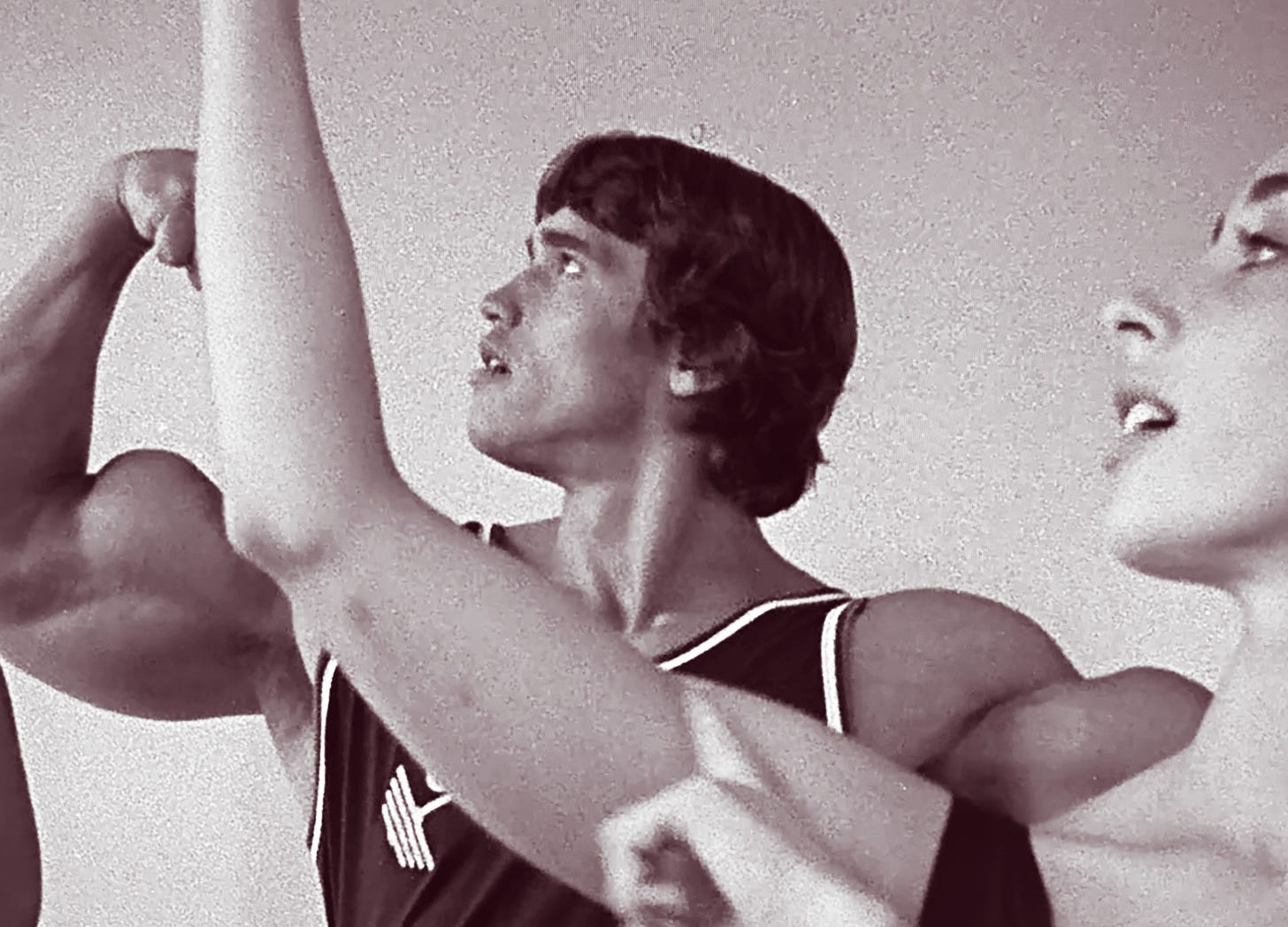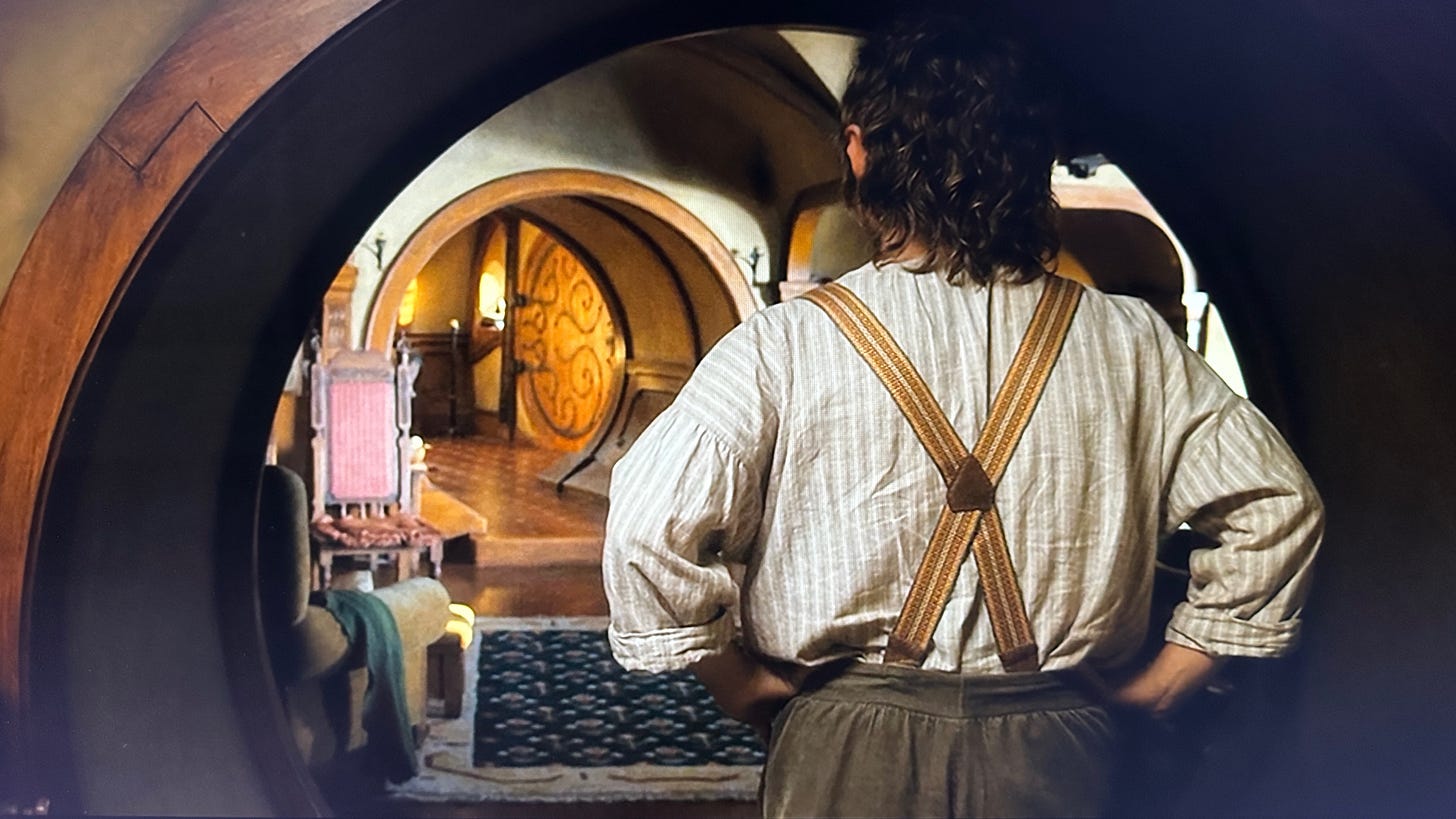Bodacious
Making something of yourself in The Hobbit and Pumping Iron

After forty minutes of history and horsing around—moral shaming, bad manners, and worse sentiment—The Hobbit finally lifts itself from the riptide of its inherited obligations to Tolkien’s book. Then, like The Birth of Venus, it pauses in the light of a new idea of man.
The Still Moment
The moment arrives when Bilbo stands in his now-empty house. The chaotic dwarves have departed; his back is to the camera; he looks through the enfilade of circular doorways leading from room to room toward the daylight at the far end of the hall. The cozy gloom gives way to the dawn-singing world. He checks each corner in stealthy sequence, reassured to find every trace of the outrageous party gone. He comes to rest at last in his privacy and his familiar ways.
Right up to this moment, Bilbo has been increasingly relieved to find himself alone, safe and sound, on the cusp of resuming tea and a pipe. Expecting satisfaction, he is unprepared for a sharp recognition: though tranquility has returned, something far more disruptive has happened to him. He has been inspired. Now he wants something he doesn’t understand. In this moment, he is for the last time motionless, gazing at the home he loves. Then, as everything he has known changes, he gives himself over to wild, uncharted territory.
Peter Jackson will soon fill the screen with goblins, wolves, dragons, forests, and noise—so much noise. Yet this quiet moment never fades for me: an interior stillness of soul pressed between a home invasion and the empire of CGI. The true beginning of the journey lies here, where everything vital is already underway inside Bilbo.
His suspenders, once trailing, are now drawn tight, the X bracing his back like an arrow behind his heart. What has changed inside him is not what he prefers but what he is at this moment becoming. The transformation pushes him through the O of each doorway, passing him along through his own smoke rings. By the time we see him dashing across the lawns and laundry of his neighbors, the signed contract flying like a standard, he has gained a humanist clarity—a sense that life’s meaning is not inherited but chosen.

I have several times felt unwell at such an obvious crossroad, dizzied under the pressure of choosing. Who doesn’t know that feeling of no longer being able to delay accepting an offer or turning it away—a job, a commitment, the end of a particular dream? There is a terrible realization that you could simply go on behaving as though you’ll always have options, but that this too is a choice, a kind of failure you can hide from everyone but yourself. And it looks just like the closed loops of Bilbo’s Hobbit home. No wonder he ran.
This act of choosing to do is the pulse of George Butler’s Pumping Iron, the story of Arnold Schwarzenegger’s sixth Mr. Olympia title in 1975. When I look at the halfling Bilbo and the bodybuilder Arnold, I don’t see opposites or cousins. I see the same person: me. And you, do you see yourself, too?
The Body As Landscape
Pumping Iron is like an inside-out landscape, a palindrome of the vast New Zealand expanses the dwarves must cross fighting tooth and nail to arrive at the actual battleground. The weightlifter’s bodies hold those miles. They contain days and months of “shocking” muscles with stripping workouts, five-hour sessions six days a week, split workouts twice a day, bulking and cutting cycles, and years of limitation, nausea, and discipline. Jackson frames his small-statured musclemen against mountains and miles, emphasizing scene by scene just how daunting is the physical course of time in their quest. Butler, by contrast, films enormous men confined to benches, stages, and the occasional hotel room, the constraints of an odyssey within.
“Arnold is the center of Pumping Iron in every way,” says photographer Annie Leibovitz, who was at the Mr. Universe contest in South Africa for Rolling Stone. “I am reluctant to have form impose the meaning on a picture. But in Arnold’s case, form is also content. His career was built on willpower.”
Willpower is exactly the substance and sustenance of Bilbo’s voyage. His peaceful nature is disturbed in a way that can’t be repaired by tidying up; the shapeshifting is out of his reach, internal, with a life of its own. He sees even his familiar hall and its pink side chair with a clarity that reveals him as someone he doesn’t yet know.
When Bilbo gives up his own preoccupations to go off on an adventure, he in essence gives up his life. He can never truly go home again, even if he lives to return to his shire. Bilbo seems at every moment drawn deeper into the recognition that one cannot simply step outside to “get another point of view.” The very act of getting it is not only informing but re-forming.
Arnold, by contrast, can choose his formation more directly. He has an exacting alchemy of how to shape his body, down to sharpening a particular line of pumped muscle. “My goal is to even out everything, that everything is perfect,” he says. “If I want to increase one muscle a half inch, the rest of the body has to increase. Everything fits together now. All I have to do now is get my posing routine down more perfect.”
To that end, we find him in Joanne Woodward’s Manhattan studio with New York City Ballet instructor Marianne Claire. “You want a pass-through position that will keep showing your body,” she tells him. “What you have to realize is that people are watching you all the time,” Claire says—not just when he hits the pose. “Start with a focus up. The eye-line goes up.” Arnold lifts his gaze. Recognition washes across his face as he feels how a simple adjustment enlarges the whole self.
The Light That Finds Us
I can’t easily take in at one glance the long tail of change and becoming that forms me. My effort is full of heart, though it has rarely matched the single-mindedness of Pumping Iron or the courage of The Hobbit. Watching Arnold expand his sense of himself reminds me how opaque to us our transformations are, something we sense more astutely than we see.
I still feel the times I made bad choices. I still have to cope with the painful effects they had. I prefer to think my wiser decisions mattered more, but I find myself wondering.
Bilbo is remade in his renaissance. He breaks free of the church of the right opinion that cossets his times. He embraces the freedom of agency, the tenet that an individual can make a contribution, even change history. The protagonists of Pumping Iron and The Hobbit embody the essence of human possibility.
It may be I’m not ambitious enough— yet. Like Bilbo and Arnold, I’m still becoming who I am, and each experience shapes the light even as it shapes the life it illuminates.


